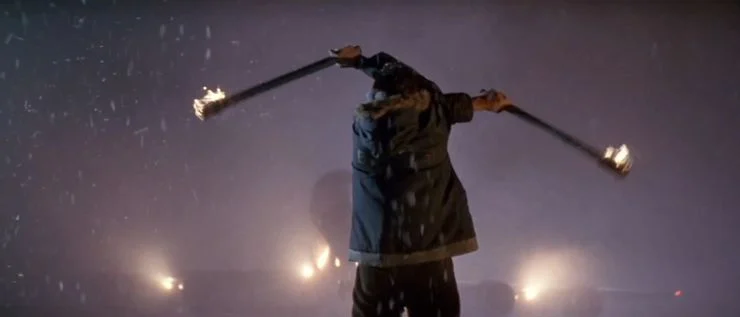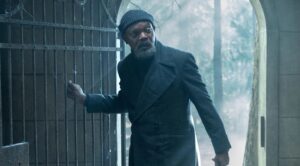
Today, I discuss the notion that when a film or TV show is set at a certain scale, there’s only so many people that can die in the film/show for it to still have a ‘happy’ ending.
This is the Cronin Theory of Pop Culture, a collection of stuff I’ve noticed over the years that I think hold pretty true.
This one is a bit tricky, since I think it involves scale to a certain degree. For instance, if you’re battling in an intergalactic war, this applies less than if you’re just a regular guy trying to save, say, an office building filled with employees enjoying a Christmas party.
In Die Hard 2, terrorists take control of a busy airport in the middle of a snowstorm so that they can hijack a plane and escaped with a drug lord dictator. John McClane is there to pick up his wife at the airport. He realizes something is wrong, so he tries to stop the bad guys.
One of the most effed up scenes occurs when the villains, who have taken control of the air traffic control tower (and are therefore not allowing any of the many jets circling the major airport to land), try to dissuade McClane and airport security from trying to stop them by using their control of the airport to alter the readings of where the ground is and so when a British jet with 200 people on board is told to land, the ground comes up too quickly and they crash. John valiantly runs to the runway with flares, hoping that he can somehow warn them in time, but he can’t and they all die.
In the end, John has killed all of the bad guys (while their deaths have left a big enough explosion that the other jets can see the runway and land safely, including the jet with John’s wife in it), but I always find that happy ending to be seriously tainted. HUNDREDS OF INNOCENT PEOPLE ARE DEAD! It was one of the biggest death totals in film history at the time!
Compare that to Alderaan being destroyed in the first Star Wars and the scale is so different. When the scale of the conflict is billions of lives, millions of lives lost doesn’t have the same drama.
However, when you’re working on the level of characters like John McClane, your happy endings really aren’t happy when hundreds of innocent people still die.










Of course, poor Colm Meaney died on that plane!!!!!
How do you cast Colm Meaney for that role and KILL HIM?!
Amusingly, the studio also thought that it was too much, and even had them to film an alternate version (which would have instead destroyed a supply plane with only two people on it), but when test audiences didn’t react negatively to the jumbo jet crashing, the studio let them keep it in. Boo!
I don’t know, Brian. I don’t think most people saw any difference between that plane and Alderaan. Whether it’s 200 people or hundreds of millions, they’re nameless, faceless and not really part of the story. Average people (meaning stupid people) don’t care. What always bugged me, was that Leia lost her parents, any other family, every person she knew growing up, and just shrugged it off like it was nothing. Of course, Luke was more upset by Obiwan’s death than that of his aunt and uncle, which is seriously fucked up. But the audience buys it because Owen is only onscreen for a few minutes and is a grouchy jerk, Beru only has about three lines, and Obiwan is a likable major character. I don’t think “scale” comes into it, only likability and familiarity.
Yeah, I think Ed says what I also think about it and I really like the Alderaan-Obi Wan-example. Although I’d say it is less a thing of stupidity than a thing of storytelling and psychology: This stories almost always tell from a personal perspective. It is a difference of an anonymous mass dying or a character we learned a lot about and we are made to care about by the story itself. So we care a lot about Obi-Wan as the mentor figure we spend the first half of the movie with and we see Luke connect to, so it feels personal, while Alderaan was killed off screen and we don’t really see Leia care (which at itself is VERY strange. We don’t see Leia mourn about it as Luke did so we don’t feel the same amount of sympathy). Same for Die Hard – we are attached to John McClane and his story and happy ending, not the mass.
I hope this doesn’t sound too heartless and emotionless by me, though. It is a total different thing if we would tell about real life where we are going to feel much more empathy when there is something bad happening.
I believe this comes down to the storytelling idea that having the baddies kill some innocents show the threat posed seem more real, and thus the survival of the other innocents or heroes more meaningful.
One more-or-less example is in the film Serenity when, towards the climax there is a major character death just before the final fight resulting in genuine tension as to whether any others would die.
Ultimately, it is a subjective matter of how much the deaths matter to the audience, partially depending on how much the characters are known to the audience. The Alderaan deaths seem less real as they were never seen only mentioned.
One XMen issue bothered me as the story had 2 innocent people die horribly as their souls were devoured by a demon. Should it not matter as much as there were only 2 of them?
“Man of Steel” is a big example. And I’m not sure if “Batman v Superman: Dawn of Justice” acknowledging it made it better or worse.
But the worst example is “Moonfall.” At some point I gave up caring if they saved mankind because there wasn’t enough mankind left. And there was a whole AI exposition thing going on while millions of people died every second.